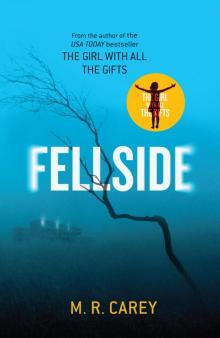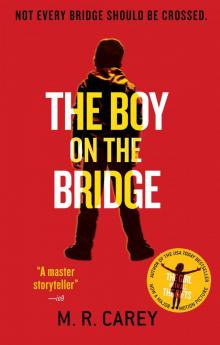- Home
- M. R. Carey
Fellside Page 6
Fellside Read online
Page 6
The guard shook her head slowly, leaning forward to turn the sound down as the credits rolled. “You haven’t met her yet.”
“Haven’t met who?”
“It doesn’t matter,” Corcoran said. “You’ll find out.”
After that, there was a visit from the governor. Ordinarily Jess would have been taken to his office, Corcoran told her, but the gurney presented logistical problems, so he came to her. He stepped into the room right after the induction video ended, as though he was the next item on the bill, and stood in stiff silence until Corcoran realised what he wanted and relinquished her chair to him.
Governor Scratchwell was a tall, gaunt man with high cheekbones hollowed out underneath, so his face was a visual mnemonic for the prison itself – perched up on a precarious cliff, remote from the world. His welcome speech to Jess, though, was all about engagement. Moral rearmament. The importance of faith in a wide, shallow, almost meaningless sense where the articles of faith never had to be stated. Jess was aware of the governor’s unease at being in the same room with her. He seemed to be using the dry, abstract words as bargepoles to fend her off with.
“My door will always be open to you,” he assured her. “I want you to believe that the most important barriers here are the ones you’ve built within yourself, and we will work with you to break them down.”
Jess had no idea what that meant, but Scratchwell didn’t invite questions. He just made his speech and left.
It seemed that the formalities were finally over. Jess was grateful for that. After the cavity search, she was half afraid she might be due for a cold shower and a delousing.
Instead she was taken up to the infirmary in the service lift, which was as big as a room. Once the lift doors closed, Corcoran took out her key and undid the cuffs.
“Now that it’s just us girls,” she said.
The infirmary was on the fourth floor of the admin block, and took up more than half of it. It looked and felt like a hospital A & E. White light from overhead strips fell on white tiles and beige linoleum. The only primary colours were in the posters on the walls: WHEN YOU SEE THIS, WASH YOUR HANDS. GET SERIOUS ABOUT YOUR HEART. CROSSING YOUR FINGERS WON’T STOP GONORRHOEA.
The reception area was also a consulting room. A meds cart was parked against one wall and steel-fronted cabinets lined two more. Handwritten sticky labels listed the contents in a neat, meticulous script that was way too small for Jess to decipher.
The place was deserted. DiMarta looked all around as though she expected it not to be. She frowned.
“Can I leave you to it?” Corcoran asked.
“Did you look at the paperwork?” DiMarta shot back, answering a question with a question. “This prisoner is high security.” Glancing at Jess, she added, “Sorry, petal, but you are. Sylvie was meant to be here, but I suppose she was called away. My shift ends in ten minutes and I can’t stay on without a chit. You’ll have to hang on until she comes back.” DiMarta had seemed pretty cavalier about the rules earlier, but apparently this one actually meant something.
Corcoran shrugged. “Still got my book,” she said. “I’ll survive. If Dennis comes after me though, you better back me up.”
DiMarta wheeled Jess through into the main ward (not the quarantine ward, as the governor had instructed – that memo had got lost in transit somewhere) and transferred her quickly and expertly from the gurney to a bed. She wrote up Jess’s chart, offered her some pain relief again, was refused again and made her exit.
Corcoran had stood in the doorway this whole while. She retreated back into the reception area now, after telling Jess to call if she needed anything. “Not that I can give you anything. But I can stand around and commiserate.”
She pulled the door to, and things went really quiet. Most rooms have some sound in them, a hum of air conditioning or gurgling in the pipes, which you’re not aware of until silence lets it through. The infirmary was truly silent. It was restful at first: Jess closed her eyes and tried to sleep.
But she opened them again almost at once. She had a weird sense that somebody had just come into the room. The silence was different now: it had become the non-sound of somebody standing very still, holding their breath.
“Hello?” Jess murmured. She thought it might be Corcoran coming in to check on her, but if it wasn’t, if she was imagining things, she didn’t want to drag the guard away from her book and look like an idiot. Nobody answered.
But she couldn’t settle after that. The feeling that she was being watched stayed with her. It was a little like the feeling Jess associated with her dreams – except that this wasn’t a multitude, it was only a single presence. And unlike the dream women, it was definitely watching her. The sense of focused attention was disconcerting, almost claustrophobic. And it intensified the longer it went on. She didn’t know how much more of it she could bear. She was going to have to sit up, although she wasn’t sure she had the strength to do that. She was going to have to see for herself that she was alone.
But the spell was broken very abruptly. A commotion started up in the reception area outside. Raised voices. A woman sobbing, another telling her to hold still. Corcoran’s voice said, “Holy fucking Jesus!” and the crying rose to a wail before it fell away into half-vocalised moans.
Nothing after that for a long while. Then Corcoran held the door open and a woman was led through, supported by a nurse who wasn’t DiMarta. “You’ve got some company,” Corcoran told Jess. She said it lightly, but her mouth was set in a tight line.
The woman the nurse was supporting was the first Fellside inmate Jess had met. She was a strange sight in a lot of ways. She wore a bright yellow tracksuit, cinched at the waist with a wide black belt that was sewn into the fabric all around. Her face was pale but suffused with red blotches, her short blonde hair plastered to her cheeks with sweat. She walked with a slight stoop, head ducked below her rounded shoulders. She looked a fair bit younger than Jess, but her face was etched with old traumas and tragedies. Her hands, held out stiffly in front of her, were encased in massive boxing gloves.
No, not boxing gloves. They were thick bandages wrapped many times around something rigid, probably splints, that kept the hands flat.
The woman was on the short side, but the nurse was shorter still and as thin as a rake. Her pinched face showed she was carrying most of the weight here. She walked the woman past Jess’s bed to the next one along, where she laid her burden down. She pulled the blankets back and brought a cotton gown from a cupboard.
“You want me to help you undress?” she asked, still a little breathless. She hadn’t looked at Jess up to that point, but now she did – with a slightly aggrieved expression as though to say, “You see how hard other people have it?”
“It still hurts,” the blonde woman whimpered.
“The painkillers haven’t kicked in yet, McBride. It will get better. You want me to help you undress?”
“I – I think I’ll just lie down for now.” The blonde woman rolled on to her side and curled into a ball, but with her hands held out so they didn’t touch the rest of her body.
“Okay then,” the nurse said. She transferred her attention to Jess. There was a second’s pause before she turned, a sort of gathering of herself. “What about you?” she demanded. “Any problems here?”
Jess shook her head, carefully and slowly, because sudden movements made it ache.
“Good,” the nurse said, flexing her wrists like someone who’d just come out of one stand-up fight and was about to wade into another. “Let’s not have any.” She stepped back through the double doors, which swung to behind her.
“Sleep well, ladies,” Corcoran said, and followed her out.
The blonde woman moaned low in her throat.
12
Shannon McBride’s big mistake had been to rip off the Q box.
It wasn’t that there was anything worth having in there. There really wasn’t. It was stuff that had been brought in as gifts for Fellside inmates but
had then fallen into a sort of unofficial escrow either because the inmate in question had been released or because the visitor’s name had dropped off the approved list.
None of that really mattered. What mattered was that by custom and practice, the stuff in that box was earmarked for Harriet Grace. Grace sat at the top of Goodall wing’s food chain where most illegal enterprises were concerned, and she policed her borders with a certain judicious fanaticism. So nobody ever touched the Q box, even though it sat out in the open in the visitors’ room where a lot of people could get to it.
Grace had no personal use for the tawdry little gewgaws in the box – a sorry flotsam of hair slides, chocolate bars, shampoo bottles, out-of-date magazines and homemade cakes. Her credit at the commissary was infinite and her cell was a cave of wonders. But there was a principle at stake, and when Mr Devlin, the shift supervisor, told her that the box had been rifled, she took it personally. “Get me a name, Dennis,” she told him. “I’m not letting this lie.”
The Devil was in Grace’s pocket, and in a number of places that were even more compromising than that, so he went away and did as he was told. He got his snitches to ask around, not about stuff that had been stolen – the whisper line usually shied away from fingering people for specific crimes – but about stuff that had been given. Who was suddenly being way too generous? Who felt snubbed because she’d seen some cool stuff being handed out and hadn’t got a share?
Shannon McBride’s name popped up like underdone toast. An impromptu search turned up about two thirds of the stolen bits and pieces stowed in all kinds of random places around her cell. In her locker, under her mattress, inside her mattress, in a scraped-out place under a loose tile – everywhere.
Devlin wrote up the theft in the daybook and told McBride to expect a spell of punitive withdrawal, which meant solitary. That was the euphemism introduced by Governor Scratchwell as part of a drive to improve morale by giving unpleasant things innocuous names. But solitary was the least of McBride’s problems now.
Grace didn’t sit on the matter for long. That was never her way. At six the same evening, the ground-floor corridor was closed off at both ends, and the Devil sent the duty officer off to the fourth floor’s solitary cells to check all the locks and light circuits for an invented fault.
And Grace held court, right there in front of everyone, in the big open space at the heart of the building’s ground floor. The ballroom.
A lot of people there felt that McBride deserved some kind of comeuppance. All the same, they were nervous. They read Grace’s mood and it was volatile in the extreme. It was never safe to be around her at times like this, and if it hadn’t been a three-line whip, enforced by Big Carol Loomis and the even scarier Liz Earnshaw, they would all have been somewhere else.
McBride was brought in and she stood before Grace, who had set up her judgement seat right in front of the TV. Normal service was clearly suspended for the duration.
“You know what you did,” Grace said, putting on her no-bullshit voice. “Everybody else here knows it too, but say it anyway.”
Unlike her two favourite enforcers, Grace didn’t have a physical presence that was in any way frightening or intimidating. She looked like Santa Claus’s slightly slimmer sister, with a face that flushed easily and a habit of sighing after she moved, as though she was about to make some jokey reference to “these old bones”. What made her scary was her reputation for never forgetting a slight and never bothering to make a distinction between great things and small. If you pissed her off, you pissed her all the way. There were no stopping points along that road.
McBride was scared shitless, but she was on the spot and there was no running from it. She was surrounded – by unwilling witnesses who also served to kettle her in with her persecutor.
“I didn’t take that stuff, Grace,” she said in a shaky voice. “I just found it.”
Grace considered this pathetic defence for a moment, and perhaps that got McBride’s hopes up because she started to stammer out some story about how she saw a packet of biscuits thrown into the animal feed tub behind the prison farm and followed a trail to the pig stall, where behind a bale of straw, like the Wise Men finding the baby Jesus… McBride had a very big mouth and not much up on top of it, so she kept on adding twiddles to this pointless fantasy to see if they improved it. That was very much her way: she clung to her stories the way some people clung to more physical and tangible addictions. Finally Grace stopped her by putting a finger to her own lips. Hush.
McBride burst into tears and said yeah, okay, she ripped off the Q box. “I didn’t mean to do it,” she snuffled. “I just was weak, Grace. I thought I could sell some of it for a hit. Then I knew I couldn’t, because I’d get found out, so I was going to put everything back the way it was, but I couldn’t get into the room to—”
“Put it down there,” Grace said. She wasn’t talking to McBride: she was talking to Big Carol and Jilly Fish, who had just come into the ballroom with two big plastic bags full of stuff. They put the bags right in the middle of the big table that had been made by pushing all the little tables together.
There was a quickening of interest around the room, like a breath all the women there took turns to let out, because it was obvious what this stuff was: it was the stolen goods from the Q box, which Mr Devlin had taken back but had then clearly passed on to Grace.
Grace stood up. She walked right past McBride, who had to step aside for her, and on over to the bags, which she upended so all the little bits and pieces went sprawling across the table: jewellery, snack foods, comic books, home-recorded CDs, jokey little souvenir statues and framed photos and a hundred other things, most of them with their in-process labels still attached by elastic bands.
“Sit down here,” Grace said to McBride, pushing a chair in front of the table. And McBride, still crying a little, did as she was told. As she sat down, Liz Earnshaw stood up.
Liz was a big woman. Every bit as tall as Big Carol although not as broad: her body and face were gaunt, the bones of her elbows very visible (she cut the sleeves off all her prison-issue sweats as soon as they were issued). But one look was all it took to make you realise you shouldn’t mess with that, shouldn’t go any nearer to it than you had to. Earnshaw had no control at all, no limits, no off-switch. She was half crazy, full of fury and violence the whole time and one bad word away from burning up like a match. But she’d come to Grace’s attention at some point and Grace had given her an official role in the Fellside political economy, which was that she hurt the people who Grace told her to hurt.
So now, seeing Earnshaw come lumbering up to the table, McBride made a little noise that was halfway between a sob and a groan. She knew this was going to be bad.
Earnshaw squatted down next to the table, and another one of Grace’s little helpers handed her a hammer. It wasn’t a big sledgehammer or even a claw hammer that a carpenter or mason would use. It was a pin hammer with a slender shaft and a dainty little head. They were used in the ceramics workshops sometimes to break old pieces of clay down into brickbats so they could be recycled, but there was no way on Earth that one of them should be out here in gen pop. There were a lot of different safeguards in place to make sure that couldn’t ever happen. But when you’ve got a senior warder tucked into your knicker elastic, checks don’t always check and balances don’t have to balance.
“So this is the deal,” Grace told McBride. “You go ahead and try to swipe three things off the table. Whatever you think you can reach. Lizzie is going to stand by with the hammer and try to stop you by hitting you in the hand whenever you go for anything.”
A wave of rustles and murmurs went around the room, a gathering of tension. Grace was well aware that all of this – this very public spectacle of pain and humiliation – might constitute going too far. But she had decided that “too far” was the right distance to go.
“Have you got that?” she asked McBride, in a gentler voice.
McBride nodded to show
that she understood. And the show commenced.
It might seem that a woman of Earnshaw’s size should be slow, but nobody who’d ever seen her move would think that.
The first time, McBride managed to fake her out. She twitched her right hand then drew it straight back again, while with her left she snagged a scarf whose trailing end was very close to her. Liz swung with the hammer and the Formica table rang like a gunshot. Its bright yellow surface now bore a perfectly circular indent. McBride’s hand didn’t, so that was one up to her. A cheer went around the room: as a spectator sport, this might not be so bad after all.
But McBride had caught a piece of beginner’s luck, and after that it evidently had other places to be. Liz had her eye in now.
There were no more cheers. A ragged chorus of gasps and sighs the first time McBride took a hit, a strained silence the second time. The silence persisted, punctuated by the sound of the hammer falling – not booming percussion but dull, meaty thwacks – and McBride’s yelping cries of shock and pain as she snatched her hand back.
For a while it looked as though McBride’s score was going to stay at one. Then she got lucky again, managing to snag a mug with her thumb (all of her fingers now being broken). It was a Happy Mother’s Day mug, and she only came away with the handle. The business end of the mug got shattered by the hammer. But Grace – the final arbiter – said that still counted.
McBride didn’t get lucky again. After ten minutes or so, it was clear that she never would, because you’ve got to have functional hands to pick things up.
But from Grace’s point of view, things were going swimmingly and the object lesson was all she’d wanted it to be. She was slow to register the changing atmosphere in the room – the way the tenor of the silence shifted and congealed. After a while, though, it was impossible to miss it. The set, stolid faces. The hands gripping knees, not moving. The eyes flicking away, each time, from the terrible moment of impact.
The ringside audience was not enjoying this. Whether or not they thought McBride had earned her punishment, they didn’t appreciate – as they should have done – her being called to account. Grace felt a surge of annoyance, but she suppressed it. These women were tough, some of them almost as tough as she was. They understood the judicious application of force, and whatever they felt about it now they would surely agree later that this was fair. Or if they didn’t, fuck them.

 Fellside
Fellside The Girl With All the Gifts
The Girl With All the Gifts The Book of Koli
The Book of Koli The Boy on the Bridge
The Boy on the Bridge Someone Like Me
Someone Like Me